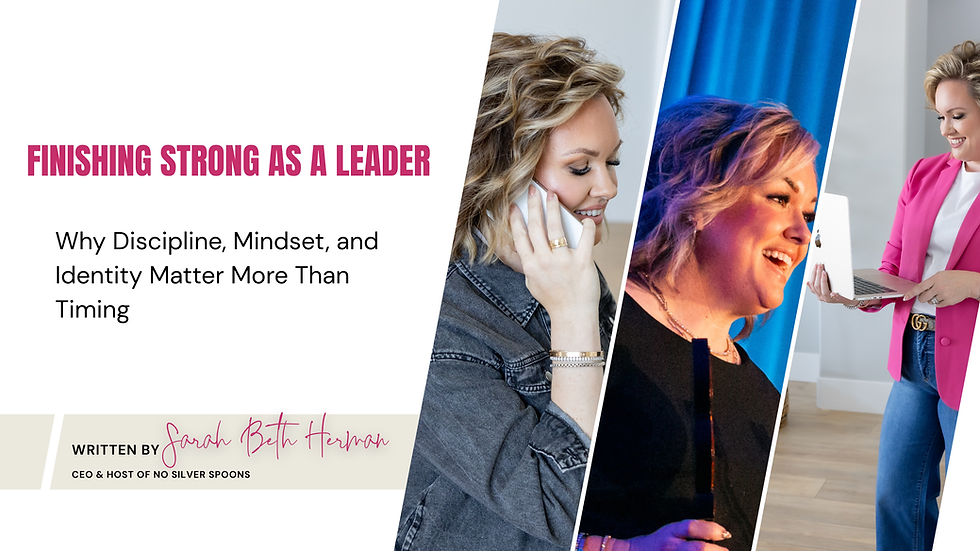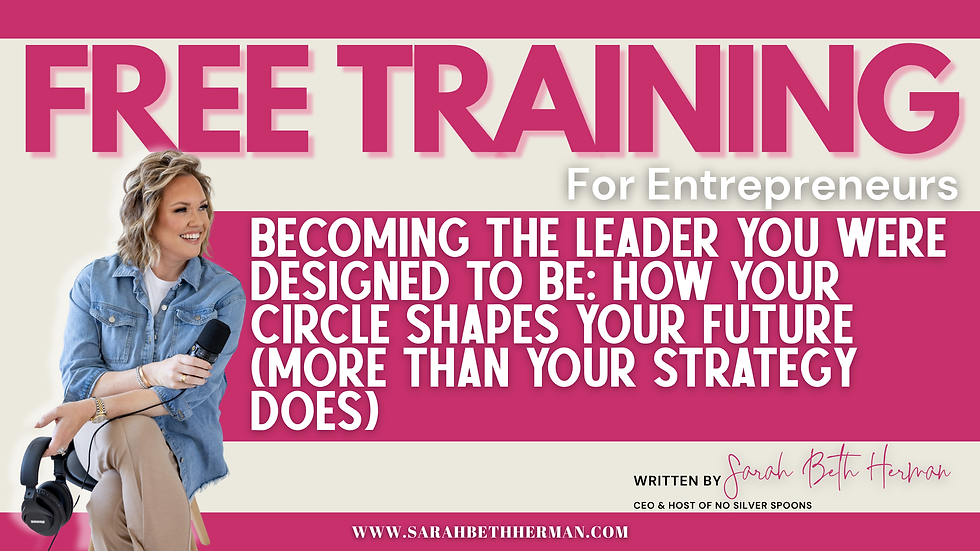Leverage the Rules: Stop Waiting and Start Trading What You Have
- Sarah Beth Herman

- Jun 5, 2025
- 5 min read
Updated: Jun 13, 2025

In the world of leadership and entrepreneurship, conversations around profitability, expansion, and scaling often focus on numbers, margins, and growth projections. But underneath the data lies something more essential: mindset. For high-level leaders, founders, and CEOs, the fear of investing in growth is real. It feels safer to maintain what’s working, stay predictable, and wait until conditions feel perfect. But in Episode 71 of No Silver Spoons, I reminded listeners that growth costs something. It costs comfort. It costs certainty. And most of all, it costs the mindset of waiting for the "right moment."
This blog post is your pre-conversation primer. It’s the warm-up before the real talk. And trust me, the episode that follows will go even deeper.
Money Isn’t the Start Line. It’s the Toolbox.
One of the biggest myths in business is that you need to "have money to make money." While finances do matter, what's often overlooked is how resourcefulness outpaces resources. A 2023 article in the Journal of Strategic Leadership showed that startups with high innovation scores saw better long-term outcomes, regardless of initial capital (Stein & Yamada, 2023). In short, it’s not about how much you start with. It’s how well you leverage what you have.
In the episode, I shared a story about a colleague who assumed I made certain moves because I had a cushion of wealth. But that isn’t how it began for me. Like many leaders building something from the ground up, I was scraping by. I built everything from sweat equity, creativity, and countless pivots. What I had wasn’t money. It was vision and the willingness to take risks.
The Comfort Trap for Leaders
Many high-level professionals stay stuck not because they lack opportunity, but because they’re holding onto comfort. You might be earning enough to get by. You might even be hitting multiple six or seven figures. But if your systems are stale, your team is uninspired, and you’re spending more time reacting than leading, you’re stuck.
The Harvard Business Review noted in a 2024 leadership study that 67 percent of executives who reported stagnation in their companies also admitted to avoiding risk out of fear of temporary setbacks (Harvard Business Review, 2024). The gap isn’t about capability. It’s about decision-making.
The Risk-Reward Mindset Shift
In the episode, I told a story about a client negotiating with a high-ticket mentor. She didn’t have the funds, but she had drive and vision. She offered a percentage of her future earnings instead of upfront cash. That’s what strategic thinking looks like. In business, this can show up as profit-sharing, creative contracting, or time-for-service arrangements.
Leadership is about negotiation. According to Koltveit and Hjertager (2022), modern CEOs succeed when they adapt business models creatively, especially in unpredictable markets.
Scarcity vs. Strategy: What Neuroscience Tells Us
Scarcity doesn’t just limit your wallet. It limits your brain’s executive functioning. A widely cited study by Mani et al. (2013) published in Science revealed that financial stress reduces cognitive capacity. That means a stressed-out CEO or entrepreneur isn’t underperforming due to a lack of talent—it’s because their brain is too busy surviving to lead effectively.
Resource-based thinking, on the other hand, opens doors. It pushes you to ask, "What else do I have?" That could be time, relationships, intellectual property, or even underutilized real estate. Could your content be repurposed into a course? Could your network fund your next venture?
Income While You Sleep: Building Passive Revenue
Let’s talk about income that doesn’t require your constant attention. For many leaders, time is the ceiling. You cannot physically be everywhere or do everything. But you can build systems that work while you rest.
There is a rise in passive income through digital courses, affiliate partnerships, licensing deals, and recurring memberships. A 2024 study in the Entrepreneur’s Financial Digest found that entrepreneurs who added at least one passive revenue stream saw an average increase in net profits of 14 percent within six months (Hernandez & McBride, 2024). The goal? Create once, refine often, market consistently.
Lessons from Real Negotiations
In the episode, I shared a story about leveraging two companies against each other to get a better deal for my business. I looked at value, ethics, and long-term potential—not just short-term profit. These are the kinds of decisions that differentiate sustainable businesses from fleeting ones.
This applies to agency contracts, partnership agreements, vendor pricing, and even licensing deals. You are allowed to ask better questions. You are allowed to negotiate. And you’re allowed to walk away from anything that doesn’t align with your long-term vision.
From Stuck to Strategic: Action Steps for Founders and CEOs
Let’s translate this into action. Here are five steps you can take this week:
Inventory Your Assets: List everything you offer that isn’t cash. Think: time, relationships, intellectual property, tools, reputation, or creativity.
Audit Your Mindset: Where are you choosing fear instead of forward motion? Are you protecting comfort at the cost of growth?
Develop a Passive Revenue Stream: It could be a toolkit, course, membership, or digital product. Choose something scalable.
Negotiate Intentionally: Pick one contract, vendor, or opportunity and ask for a better arrangement. Use facts and frame it as a partnership.
Say the Scary Yes: Maybe it’s hiring help, launching that offer, or pitching a bold idea. You don’t need to feel ready. You just need to start.
You Are Not Too Late
If you're reading this thinking, "This sounds amazing but not for me," let me just say: I didn’t start with a perfect plan. I built while figuring it out. I invested before I had a full safety net. I bet on myself before I felt qualified. And sometimes, I still do.
In leadership, there’s no "silver spoon" moment where someone hands you a fully funded dream. There are only decisions. The question is: What will you do with what you have now? So, stop waiting. The resources are there. The growth is waiting. But you’ve got to be bold enough to believe that what you have today is already enough to begin.
Ready for more? Listen to Episode 71 of No Silver Spoons titled "Leverage the Rules: Stop Waiting and Start Trading What You Have" wherever you stream your podcasts. It's a raw, honest conversation you didn’t even know you needed. Let it stir something in you.
References
Harvard Business Review. (2024). The Leadership Paradox: Why Growth Feels Risky When It’s Most Needed. https://hbr.org
Hernandez, M., & McBride, S. (2024). Passive income strategies for entrepreneurs. Entrepreneur’s Financial Digest, 18(2), 56-62.
Koltveit, B. J., & Hjertager, B. H. (2022). Adaptation of business strategy in evolving markets. Strategic Management Journal, 34(1), 22-30.
Mani, A., Mullainathan, S., Shafir, E., & Zhao, J. (2013). Poverty impedes cognitive function. Science, 341(6149), 976-980.
Stein, L., & Yamada, J. (2023). Innovation outcomes in low-capital startups. Journal of Strategic Leadership, 27(3), 39-45.
Welcome to the best mentor site for business professionals and business owners. Join our weekly mentor group or schedule your one-on-one mentor call now. Available for men and women! Sarah Beth Her...

Disclaimer: The information provided in this blog is for informational purposes only and does not constitute professional advice. Readers should consult with appropriate professionals for specific advice tailored to their circumstances. All efforts have been made to ensure the accuracy of information and references; however, errors may occur. If you notice any inaccuracies or would like to suggest updates, please contact us at hey@sarahbethherman.com. © 2025 Sarah Beth Herman. All Rights Reserved. By using this site, you agree to our Privacy Policy and Terms of Use. This post may contain affiliate links, and we may earn a commission at no extra cost to you if you make a purchase through them. References included where known. Please email hey@sarahbethherman.com to report missing attributions or inaccuracies.



Comments